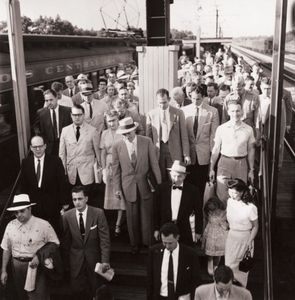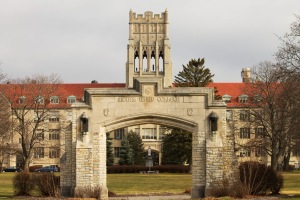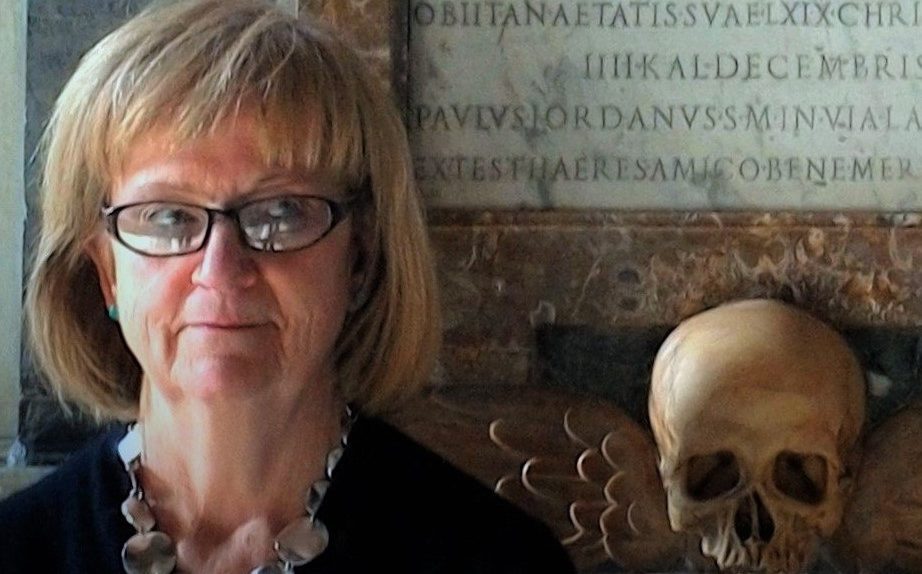 By the time World War II ended in 1945, my father was married to my mother and had a child, my sister Marbeth. He came home from the War in dire need of a job, and so he used the G.I. Bill to attend “Insurance School” in Boston. When he completed that program, he came back to Chicago and was hired by James S. Kemper Insurance. Two years after Marbeth was born, Johnnie came, then Jamie, then Susan, and then me. In a little more than a decade my father went from being a dashing figure in an Air Force Navigator’s jacket to one of the men who carried a briefcase and commuted every day from a little house in Park Forest, Illinois to downtown Chicago. He was good at his job and he liked it fine; he was promoted and rose up the ranks until 1963, when the Big Promotion came. My dad was named President of the new Milwaukee Office, and we moved our family and our fortunes to Milwaukee,
By the time World War II ended in 1945, my father was married to my mother and had a child, my sister Marbeth. He came home from the War in dire need of a job, and so he used the G.I. Bill to attend “Insurance School” in Boston. When he completed that program, he came back to Chicago and was hired by James S. Kemper Insurance. Two years after Marbeth was born, Johnnie came, then Jamie, then Susan, and then me. In a little more than a decade my father went from being a dashing figure in an Air Force Navigator’s jacket to one of the men who carried a briefcase and commuted every day from a little house in Park Forest, Illinois to downtown Chicago. He was good at his job and he liked it fine; he was promoted and rose up the ranks until 1963, when the Big Promotion came. My dad was named President of the new Milwaukee Office, and we moved our family and our fortunes to Milwaukee,  Wisconsin.
Wisconsin.
For a while, my dad enjoyed his new position a great deal; he was a good insurance salesman, and he had a number of lucrative accounts—Milwaukee companies such as Bucyrus-Erie, Cutler-Hammer, Johnson Controls. His salary rose steadily and there were generous bonuses. My dad was very good at recognizing talent and training other young men to excel at the insurance business. In those days, success was about numbers and risk assessment, of course, but it was also about personal relationships. People liked my father, and he liked them. Back in Chicago at the Home Office of James S. Kemper, the powers-that-be were impressed with the men my dad hired and trained—so impressed that they repeatedly took them away from the Milwaukee office and gave them branch offices of their own, which was very good news for those young men but not such good news for my father.
As the years progressed and the World War II generation aged, the next wave of talented and bright young men started going to college instead of to work after high school. It was more and more difficult for my dad to find qualified young men who wanted to leave high school and go right to work. The people he ended up hiring were no longer the cream of the crop, and the strain started to wear on him. At the same time that his talent pool was striking out for greener pastures, my dad’s drinking was escalating and causing some serious damage in his personal and family life. We were all deeply relieved and grateful when he started going to Alcoholics Anonymous in 1970, and stopped drinking. While his drinking habits changed, however, the insurance world hadn’t changed, and entertaining clients was still a big part of success in his field. Desperately needing to stay sober, my father was less and less eager to take clients out for nights on the town, and when he did go out, his clients were not impressed with a man who didn’t have the bonhomie to have a drink (or ten) with them.
In the 1970’s, Milwaukee was still the home of large manufacturing companies, and my dad wrote the insurance for just about all of them. When those factories and companies closed down, one after the other, my dad lost account after account. While it was through no fault of his that the face of Milwaukee industry was changing, the bottom line at the  Milwaukee office was looking sorrier and sorrier, and James S. Kemper let my dad know about their disappointment, loudly and clearly. My dad didn’t retire until 1990, but the last twenty years of his work life were miserable. He hated going to work, hated how little the young men (and now women) cared about doing things the way he had always done them, hated the steep learning curve of confusing new technology, hated prostrating himself to write insurance for submarine sandwich shops instead of giant manufacturing concerns.
Milwaukee office was looking sorrier and sorrier, and James S. Kemper let my dad know about their disappointment, loudly and clearly. My dad didn’t retire until 1990, but the last twenty years of his work life were miserable. He hated going to work, hated how little the young men (and now women) cared about doing things the way he had always done them, hated the steep learning curve of confusing new technology, hated prostrating himself to write insurance for submarine sandwich shops instead of giant manufacturing concerns.
I was the fifth of the five Maloney children, and my childhood coincided with the hardest years of my dad’s career. My mother stayed at home and reared us, every now and then taking on a part-time job once we were all in school, but never as a way to help support the family. Supporting the family was 100% my father’s project, and he persevered. He worked his way through tuition for Catholic high schools, Catholic colleges—and Catholic law school for three of the five Maloney children. Nonetheless, the image of “the working life” etched into my mind at a young age was that “work” was draining, a form of drudgery that offered neither inspiration nor joy; work sucked the pleasure out of life like a straw sucks air out of a tire. As a child, I didn’t think much about what I “wanted to do” when I grew up, but I knew with every fiber of my being what I didn’t want to do—I didn’t want to get a job and end up as stuck as my father.
My siblings knew that they were expected to work while they were in high school and college, and work they did. My brothers and sisters were all good students during the school year and stoic worker-bees during the summer. My sisters’ jobs didn’t seem completely terrible—they worked in retail, mostly—but my brothers’ jobs seemed to have sprung out of the bleakest Dickens novel. They worked at places like Continental Can, Allis-Chalmers, Berger Polishing, the Milwaukee Sanitation Department (in other words, they were garbage men), and SuperExcavators. These jobs entailed long hours, oppressive heat, terrible smells, back-breaking labor, and continual harassment from the regular workers who sneered at the “college boys” and gave them all the worst tasks. And although my sisters never faced the harsh and dreadful summers that my brothers endured, they, too, often came home exhausted from long days of standing, frustrating days of being yelled at and treated badly by customers and crabby supervisors.
The first powerful career goal I had, therefore, was simple: I never wanted to get a job. Ever. I knew that this path would be a challenging one, because I would be expected to work just as my siblings had worked, just as my father went to work every day. Without even consciously planning it, I started to “lay low” right around the time I turned sixteen, typically the age at which my siblings started applying for jobs. I accepted every baby-sitting job offered to me, in hopes that the money I earned there would suffice. It was hard to make a decent living at babysitting, however, because my mother refused to let me babysit for anyone except my own nieces and nephews. My grandmother—her mother—had cared for her nine surviving siblings after their mother died young, and was tired of children by the time she got married herself. Not wanting her own daughters to “wear themselves out” taking care of other peoples’ children, my mother enforced her strict “only family” rule.
I adored my nieces and my nephew—my sister Marbeth’s children—and often spent time with them even when I wasn’t being paid, so babysitting for them never seemed like a job. My hope was that I could keep this “not-job” long enough to escape some truly awful “real job” that might be awaiting me. Also, an advantage of being the youngest of five children is that by the time I came along, my mom and dad were pretty tired and just didn’t pay as much attention to me. I sort of meandered around “under the radar” for a while. Even I knew, however, that my day of reckoning had to arrive. And so it did.
In the summer of my junior year of high school, my mother started suggesting I turn in applications for a job. My friends were getting summer jobs, and of course my ever-industrious siblings were already hard at work in their gulag style summer jobs. I saw no way out of leaving the house every day to walk the pavement and look for a job that I passionately did not want. Once out of the house, it occurred to me that the Wauwatosa Public Library was a couple of miles up the street, and air-conditioned. My problem was solved. I would leave the house, walk to the library, read all day, walk home and sigh sadly, eyes downcast, when my mother inquired about my prospects. Did I feel guilty about this deception? Of course I did. But the alternative was worse. The alternative was getting an actual job. Not surprisingly, I did not find a job that summer.
 Then my senior year of high school was drawing to a close and even I knew the jig was up. If I didn’t find a job, my mother was going to find one for me, and she was very excited about the prospect of placing me on the coattails of my sisters, both of whom had worked in the Book Department of Marshall Field and Company. I was forced to interview with the supervisor there, a woman named Mrs. Price who despised my sister and made it clear that she was fully expecting to despise me, too. Figuring that any job I found myself was better than being the third Maloney girl for Mrs. Price to torture, I applied for a job at Northwestern Mutual Insurance Company, housed in a forbidding grey behemoth of a building in downtown Milwaukee. I do not recall whether I recognized the irony of following my father, however temporarily, into the insurance business. I only knew that this job had a big advantage: if I got it, I was pretty sure my mother wouldn’t let me take it.
Then my senior year of high school was drawing to a close and even I knew the jig was up. If I didn’t find a job, my mother was going to find one for me, and she was very excited about the prospect of placing me on the coattails of my sisters, both of whom had worked in the Book Department of Marshall Field and Company. I was forced to interview with the supervisor there, a woman named Mrs. Price who despised my sister and made it clear that she was fully expecting to despise me, too. Figuring that any job I found myself was better than being the third Maloney girl for Mrs. Price to torture, I applied for a job at Northwestern Mutual Insurance Company, housed in a forbidding grey behemoth of a building in downtown Milwaukee. I do not recall whether I recognized the irony of following my father, however temporarily, into the insurance business. I only knew that this job had a big advantage: if I got it, I was pretty sure my mother wouldn’t let me take it.
The job I applied for involved sorting computer output for every employee on the seventh  floor. I would be expected to arrive at my job, pick up my giant cart, wheel it to the Room With the Giant Computer They Actually Called Hal, have stacks and stacks of computer printouts loaded onto my cart, wheel the cart back to the seventh floor, and spend the next four hours sorting it according to a system of rules so intricate and weird they could have been straight out of a wizard’s spell book. The most important fact about this job, however, was that since the drones office personnel needed their computer printouts on their desks at 9 a.m. sharp, my workday began at 5 a.m. and ended at 10 a.m. In order to get to my job, I would have to get up every morning at 3:30 a.m., drive downtown, park my mother’s car and step over last night’s drunkards and bums to get to the front door of Northwestern Mutual Insurance Company. No way, I thought, would my mother risk my health and safety in that manner.
floor. I would be expected to arrive at my job, pick up my giant cart, wheel it to the Room With the Giant Computer They Actually Called Hal, have stacks and stacks of computer printouts loaded onto my cart, wheel the cart back to the seventh floor, and spend the next four hours sorting it according to a system of rules so intricate and weird they could have been straight out of a wizard’s spell book. The most important fact about this job, however, was that since the drones office personnel needed their computer printouts on their desks at 9 a.m. sharp, my workday began at 5 a.m. and ended at 10 a.m. In order to get to my job, I would have to get up every morning at 3:30 a.m., drive downtown, park my mother’s car and step over last night’s drunkards and bums to get to the front door of Northwestern Mutual Insurance Company. No way, I thought, would my mother risk my health and safety in that manner.
I was wrong. My mother was fine with my job’s hours, and no matter how darkly I painted the picture of my harrowing and dangerous morning commute, she just laughed and said I was certainly a very dramatic girl. The pay was great, she told me, and it wasn’t even a full time job, so I should consider myself lucky. I did not consider myself lucky.
 I hated that job. I hated getting up in the middle of the night; I hated driving my mother’s notoriously unreliable car downtown; I hated my giant cart; I hated Hal and all his minions; I hated feeling scared and stupid all the time as I figured out which sheets of input went on which desk, and I hated being surrounded by people whose entire lives consisted in showing up every day in that giant mausoleum of a seventh floor and adding up the numbers of people who had accidents in their bathrooms every year in Pomona, California.
I hated that job. I hated getting up in the middle of the night; I hated driving my mother’s notoriously unreliable car downtown; I hated my giant cart; I hated Hal and all his minions; I hated feeling scared and stupid all the time as I figured out which sheets of input went on which desk, and I hated being surrounded by people whose entire lives consisted in showing up every day in that giant mausoleum of a seventh floor and adding up the numbers of people who had accidents in their bathrooms every year in Pomona, California.
My main source of comfort and solace in those days was food, and I gained forty pounds that summer. I would get home from my job at around 11:00 in the morning, glassy-eyed, exhausted and depressed, fix myself some food, and watch reruns of Happy Days and Laverne and Shirley as I “rested up” for the next day’s weary march into the Building Where Hope Went To Die.
In spite of my despair, I ended up learning to do this job very well, and when it was (joy!) time to quit because I was starting college, the Supervisor of the Seventh Floor offered me a big raise and more flexible hours if only I would stay. There was no chance of that. I was grateful to have survived at all, and had no desire to gain another forty pounds, and another forty after that. Who knew where such a path might end?
I made a good bit of money that summer, especially considering my job’s lack of full time status. The most important thing my job at Northwestern Mutual Insurance Company did for me, though, was remove any trace of doubt from my mind that I wanted to go to college. As I

stood over my desk, arranging the computer printouts on my cart, day after day, “college” became a mantra for me; I had gone from being a pretty terrible student in grade school, to a B student in high school. After my months at Northwestern Mutual Insurance Company, I would never slouch my way through a school year again. Having seen the alternative, I couldn’t wait to get back into a classroom, where people actually wanted me to do things like write papers on the Revolutions of 1848 and the differences between Iago and Falstaff in Shakespeare’s plays. I never took school for granted again, and I understood for the first time how lucky I was to go to school at all. When I took my place in the Freshman class at Mount Mary College, I was very, very ready.



Just want to say, the photo of the train platform is the 211th st station near our house in park forest. The actual train platform we always used to go downtown.
LikeLiked by 1 person
I found it in the Park Forest Archives!
LikeLike
Love your characterization of the gulag from HAL. :>)
LikeLike